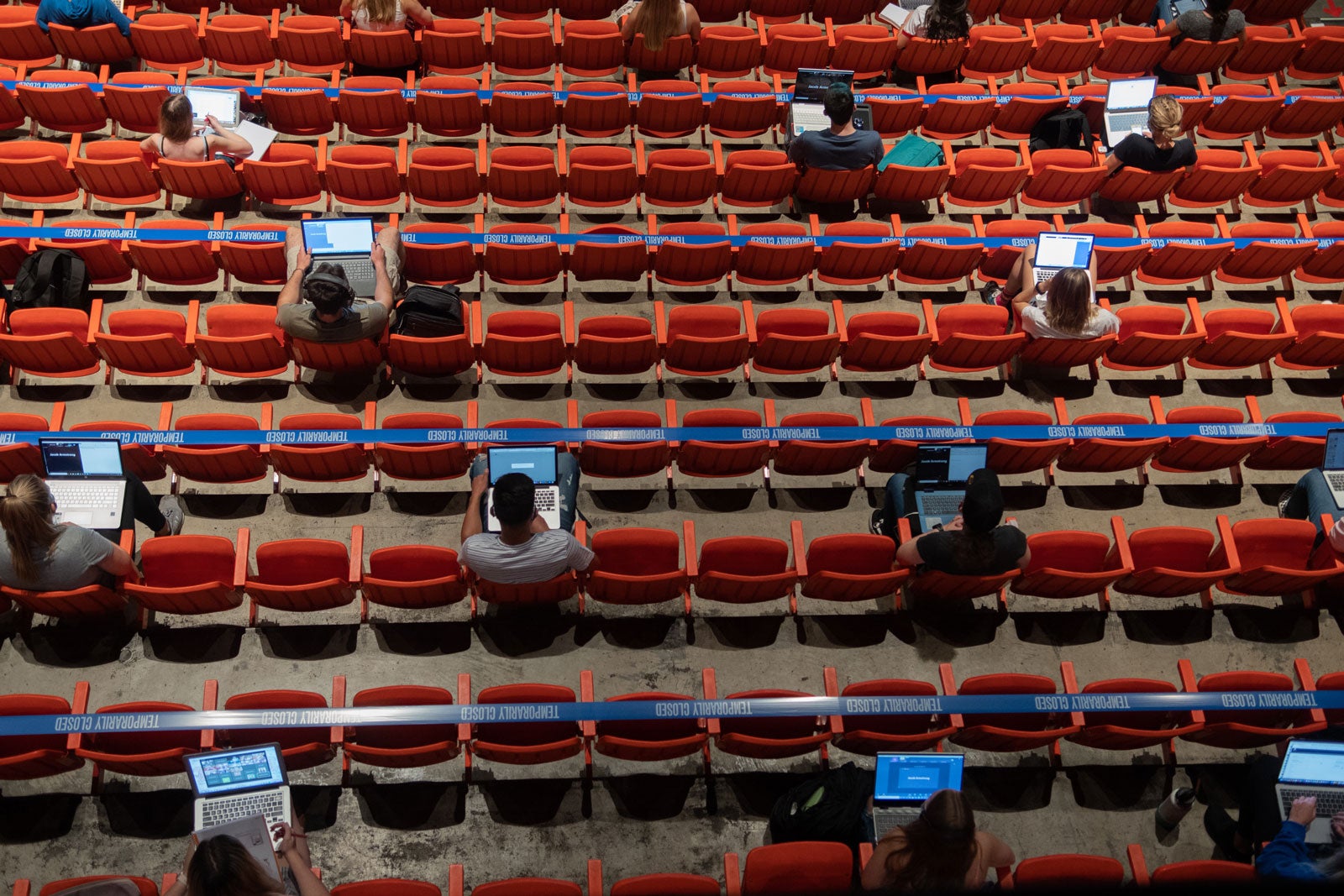
March 13, 2020 , signaled the arrival of COVID-19 in Idaho with the first identified novel coronavirus patient.
As the date rolls back around, the Boise State community and the rest of the state are poised to enter a third year of the disruption wrought by the pandemic.
And while much remains uncertain about the path the virus will take going forward, university and college leaders are clear and united on the fact that students have been hit hard by events of the past two-plus years — and that they will continue to bear down on the multiple challenges, many of them having to do with mental and emotional health. It’s for those reasons that faculty and staff members want to draw attention to students’ states of mind during and after Bronco Giving Day, which took place March 3 and 4.
The ways in which the pandemic has affected students vary, of course, and some students’ lives have remained relatively untroubled. But college and university life are often the first time young people are away from their homes and lifelong communities for long periods of time — and even those rhythms of life were shattered, when many students needed to return home due to the pandemic.
And because the college experience is intrinsically tied to multiple new and challenging experiences, throwing in a constantly changing virus and the demands that the highly fluid situation has placed on campus planners to continue to shift teaching and gathering policies has meant a worrying rise in everything from substance abuse to suicide. Depression, anxiety, feelings of isolation and hopelessness and a host of other problems have proliferated, making learning, student success and student satisfaction with their university experiences elusive.
The state of mental health for young people, by the numbers
Broncos are not alone.
The significant distress of young people is apparent at all levels of policy-making and planning. In November, the World Health Organization noted that:
- Globally, one in seven 10-to-19-year-olds experiences a mental disorder, accounting for 13% of the global burden of disease in this age group.
- Depression, anxiety and behavioral disorders are among the leading causes of illness and disability among adolescents.
- Suicide is the fourth leading cause of death among 15-to-19-year-olds.
- The consequences of failing to address adolescent mental health conditions extend to adulthood, impairing both physical and mental health and limiting opportunities to lead fulfilling lives as adults.
In early December, U.S. Surgeon General Dr. Vivek Murthy issued an advisory that noted the “mental health crisis” among the nation’s youth.
“Mental health challenges in children, adolescents and young adults are real and widespread. Even before the pandemic, an alarming number of young people struggled with feelings of helplessness, depression, and thoughts of suicide,” he said. “The COVID-19 pandemic further altered their experiences at home, school and in the community, and the effect on their mental health has been devastating.
“The future wellbeing of our country depends on how we support and invest in the next generation.”
According to the UnitedHealth Group’s United Health Foundation, suicide is the 10th-leading cause of death in the United States and the fourth-leading cause of death for adolescents ages 15 to 19 globally. And while Idaho’s suicide rate improved slightly last year from the 2020 record – in 2020, the Idaho Department of Health & Welfare reported 420 deaths by suicide, a 16% increase from the previous year, believed in significant part due to the impact of COVID-19 – deaths due to intentional self-harm are higher by a third in Idaho than is the average across the country, according to the United Health Foundation; 21 people in Idaho die by suicide for every 100,000 residents, compared with an average nationwide of fewer than 15 people per 100,000.
Idaho ranks 40th of the 50 states in terms of the rate of suicide, according to the foundation’s America’s Health Rankings report.
Building a Thriving Community
And the damage is lingering, and it ripples out. As the United Health Foundation has pointed out, when someone dies by suicide, all of those exposed to the loss may experience different levels of grief and trauma.
Boise State has dug in on many fronts, and while COVID-19 has magnified the needs, the university already had plans to build out resources for enhanced student well-being, through the “thriving community” component of its Blueprint for Success strategic plan.
The College of Health Sciences is a supporting partner of the Associated Students of Boise State University’s mental health initiative for the current academic year. Last fall, Associate Dean of Students Lauren Oe, herself a licensed master social worker, received a $304,000 grant to further suicide prevention efforts at Boise State. The three-year grant, which follows on a 2018 grant, is funded through the Garrett Lee Smith Memorial Act, designed to help colleges and universities support wellness promotion.
Michelle Tassinari, the outreach and prevention case manager for the Office of the Dean of Students who co-authored the grant, will guide its implementation; a fundamental aim is for faculty members to be able to take part in training to better equip them to support students.
Part of the grant is meant to support the building of a “JED Campus” component within the university. Established by the Jed Foundation, a national nonprofit that works to protect emotional health and prevent suicide among the nation’s young people, the JED Campus initiative has resulted in a nationwide network of more than 100 university campuses that are assessing and enhancing their mental health, substance misuse and suicide prevention programs and systems to strengthen mental health safety nets; locally, the College of Western Idaho has taken the same approach. JED Campuses take part in a multi-year assessment and planning process with the goal of demonstrably changing the state of mental health on college campuses.
Become a donor to support Boise State students’ mental well-being.